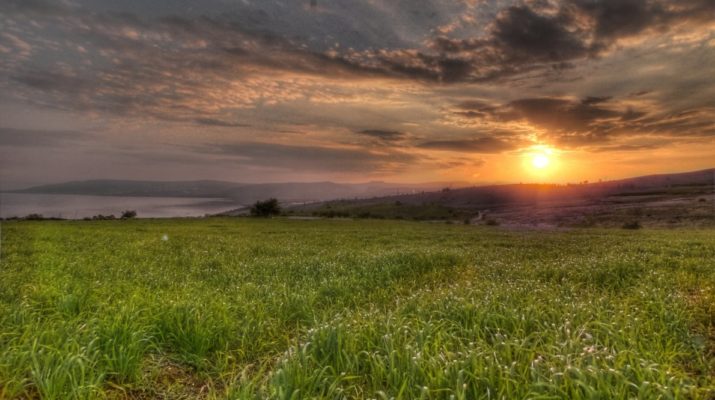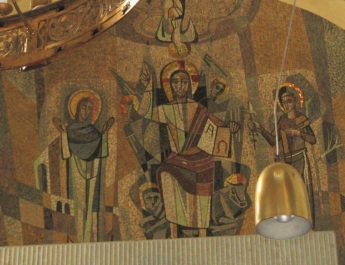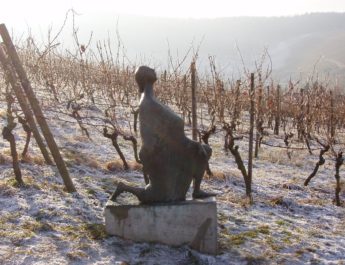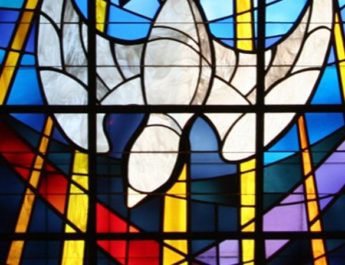Joel 2:21-27
Thanksgiving Day B
21 Do not fear,A O soil;B
be gladC and rejoice,D
for the LordE has doneF great things!G
A “fear” = yare. This is to fear, be afraid, dreadful. It can also refer to fearful reverence – to fear in a moral sense is to say to revere, respect.
B “soil” = adamah. From the same as adam (man, humankind); perhaps from ‘adom (to be red). This is ground, earth, soil as red, or land.
C “be glad” = gil. Properly, this is twirling around because of a strong feeling whether of rejoicing or from fear. This can be rejoice, be glad or joyful, or to cry.
D “rejoice” = samach. This is to rejoice or be glad. Properly, it is to brighten up in a literal or figurative sense.
E “Lord” = YHVH. From havah (to be, become) or hayah (to come to pass, become, be). This is the name of the God of Israel, the self-existent and eternal one, the tetragrammaton. This pronunciation has been lost to time so “Lord” is generally used in its place.
F “done” = asah. This is to make, do, act, appoint, become in many senses.
G “great things” = gadal. This is to grow up, become great, become wealthy – to advance. The root meaning may be to twist in the sense of the process of growing.
22 Do not fear, you animals of the field,H
for the pasturesI of the wildernessJ are green;K
H “field” = sadeh. This is literally field, ground, soil, or land. It can be used to mean wild like a wild animal.
I “pastures” = naah. 12x in OT. From the same as naveh (home, place where shepherd or sheep live; at hme implies a lovely place or a place of satisfaction); from navah (home, beautify, praise) OR from naah (to be at home and so pleasant, beautiful). This is a home, pleasant place, or pasture.
J “wilderness” = midbar. From dabar (to speak, command, declare). This is mouth or speech. It can also be desert or wilderness. Additionally, it can be used for a pasture to which one drives cattle.
K “are green” = dasha. 2x in OT. This is to sprout, grow green. It is also in Genesis 1:11 where the earth puts forth vegetation.
the treeL bearsM its fruit,N
the fig tree and vineO giveP their full yield.Q
L “tree” = ets. Perhaps from atsah (to shut, fasten, firm up, to close one’s eyes). This is tree or other things related to trees like wood, sticks, or stalks. It can also refer to wood products like a plank or staff or gallows. Additionally, this can refer to a carpenter.
M “bears” = nasa. This is to lift in a broad sense, literally and figuratively. So it could be to carry, take, or arise. It could also be bring forth, advance, accept.
N “fruit” = peri. From parah (to bear fruit, grow, be fruitful, increase; bearing fruit in a literal or figurative sense). This is fruit or reward.
O “vine” = gephen. Root may mean to twine or bend. So, it is a vine, particularly referring to grapes.
P “give” = natan. This is to give, put, set, offer. It is to give literally or figuratively.
Q “full yield” = chel. From chul (whirling around so dancing as in a circle or writhing in pain; used particularly for the pain of childbirth or from writhing due to fear; can also be falling in pain or waiting) OR from chayil (strength, wealth, ability, activity; a soldier or a company of soldiers; goods; a force of people, means, or goods; valor, virtue, or strength); from chul (to be firm, strong, prosperous; to endure). This is an army, entrenchment, fortress, wall, or host.
23 O childrenR of Zion,S be glad
and rejoice in the Lord your God;T
R “children” = ben. From banah (to build or obtain children). This is son, age, child. It is son in a literal or figurative sense.
S “Zion” = Tsiyyon. Related to tsyiyyun (signpost, monument); from tsavah (to charge someone, to command, order); from the same as tsiyyah (dryness drought); from a root meaning parched as desert, dry land. Zion can refer to a mountain in Jerusalem as well as another name for Jerusalem itself or the people.
T “God” = Elohim.
for he has given the early rainU for your vindication,V
he has poured downW for you abundant rain,X
the early and the later rain,Y as before.Z
U “early rain” = moreh. 3x in OT. From yarah (to throw, shoot, be stunned; to flow as water so figuratively to instruct or teach). This is early rain, teacher, what is taught, archer.
V “vindication” = tsedaqah. From the same as tsedeq (rightness, righteousness, vindication. It is everything that is just or ethical. That which is right in a natural, moral, or legal sense. It also includes just weights (i.e. true weights). Figuratively, this is justice, righteousness, equity – even prosperity). This is righteousness, justice, righteous acts, and moral virtue.
W “poured down” = yarad. This is to go down, descend; going down in a literal or figurative sense. It can be going to the shore or a boundary, bringing down an enemy.
X “abundant rain” = geshem. Perhaps from gasham (to rain). This is rain, shower, or rainy. It can be used figuratively for blessing or for destruction.
Y “later rain” = malqosh. 8x in OT. From the same as leqesh (later growth, spring crop); from laqash (to take everything, gathering the later crop). This is late or the spring rain. Can refer figuratively to eloquence.
Z “before” = rishon. From rishah (beginning or early time); from rosh (head, captain, or chief; excellent or the forefront; first in position or in statue or in time). This is first, former, ancestor, beginning, ranked first.
24 The threshing floorsAA shall be fullBB of grain,CC
AA “threshing floors” = goren. Root may mean to smooth. It is a threshing floor, barn, or open areas more generally.
BB “be full” = male. This is fill, satisfy, replenish, accomplish, fulfill, confirm, or consecrate. It is fill in a literal or figurative sense.
CC “grain” = bar. 14x in OT. From barar (to select, polish, cleanse, brighten, purify). This is something that is winnowed so any kind of grain, whether in the field or harvested. It can be corn, wheat, or other grains. This can also refer to a field or the open country.
the vatsDD shall overflowEE with wineFF and oil.GG
DD “vats” = yeqeb. 16x in OT. This is wine vat or wine press. Root may mean to excavate – so it would be the trough as excavated. Specifically, it could refer to a vat that collects wine or an upper vat where grapes are crushed.
EE “overflow” = shuq. 3x in OT. This is to be plenty, to flow over in abundance.
FF “wine” = tirosh. From yarash (inheriting or dispossessing; refers to occupying or colonizing – taking territory by driving out the previous inhabitants and living there instead of them; by implication, to seize or rob, to expel, ruin, or impoverish). This is new wine or sweet wine – wine that is freshly squeezed. Sometimes used for fermented wine.
GG “oil” = yitshar. From tsahar (to press oil or glisten). This is fresh oil, anointed. It is oil as that which is burned to make light; used figuratively to talk about anointing.
25 I will repayHH you for the yearsII
that the swarming locustJJ has eaten,KK
HH “repay” = shalam. This is to be complete or sound – to have safety mentally, physically, or extending to one’s estate. So, if these things are safe and complete, the implication is that one would be friendly; and, if being friendly, one would make amends and that friendship would be reciprocated. This is the root verb that “shalom” comes from, the Hebrew word for peace.
II “years” = shanah. From shana (to change, alter). This is a year, age, old. It can also mean yearly.
JJ “swarming locust” = arbeh. From rabah (increasing in any aspect whether quantity, authority, size, quality, greatness, etc.). This is a locust from its abundance – a swarming locust or grasshopper.
KK “eaten” = akal. This is to eat, devour, burn up, or otherwise consume. It can be eating in a literal or figurative sense.
the hopper,LL the destroyer,MM and the cutter,NN
my greatOO army,PP which I sentQQ against you.
LL “hopper” = yeleq. 9x in OT. Root may mean to lick up. So, this is one that devours, a young locust or caterpillar.
MM “destroyer” = chasil. 6x in OT. From chasal (to finish or consume). This is a locust as having a ravenous appetite – one that strips plants, a grasshopper or caterpillar.
NN “cutter” = gazam. 3x in OT. Root may mean devour. This is a locust or caterpillar.
OO “great” = gadol. Related to “great things” in v21. From gadal (see note G above). This is great, high, bigger, noble, old, marvelous. It can also refer to someone who is powerful or distinguished.
PP “army” = chel. Same as “full yield” in v22. See note Q above.
QQ “sent” = shalach. This is to send out, away, send for, forsake. It can also mean to divorce or set a slave free.
26 You shall eat in plentyRR and be satisfied,SS
and praiseTT the nameUU of the Lord your God,
who has dealtVV wondrouslyWW with you.
RR “eat in plenty” = akal + akal. Akal is the same as “eaten” in v25. See note KK above. The word is repeated twice – the second time as an Infinitive Absolute. The Infinitive Absolute serves to emphasize the sentiment of the word. It is rather like Foghorn Leghorn’s speech pattern, “I said, I said.”
SS “be satisfied” = saba. To be satisfied or full in a literal or figurative sense. Also, to have plenty of.
TT “praise” = halal. This is to be clear – it originally referred to a sound, then a color. It was to shine and then make a show or boast then to rave. In a causative sense it came to mean celebrate, give glory, sing praise, or be worth of praise. Because of the celebratory nature of the word, it could also mean to give in marriage. This is where Hallelujah comes from.
UU “name” = shem. May be from sum (to put, place, set). This is name, fame, renown. A name was thought to indicate something essential about a person – something about their individuality. So, this word can also mean honor, authority, or character.
VV “dealt” = asah. Same as “done” in v21. See note F above.
WW “wondrously” = pala. From pele (wonder, miracle, wonderful, marvelous thing). This is to be extraordinary, to arise, to be great or accomplish.
And my peopleXX shall never againYY be put to shame.ZZ
XX “people” = am. From amam (to darken, hide, associate; creating shadows by huddling together). This is people or nation. It can be used specifically for a tribe, collectively of troops or armies, or figuratively to refer to a flock of animals.
YY “again” = olam. This is a long scope of time whether in the past (antiquity, ancient time) or in the future (eternal, everlasting).
ZZ “put to shame” = bosh. Properly, this means to be pale, which implies shame, disappointment, or confusion.
27 You shall knowAAA that I am in the midstBBB of Israel,CCC
and that I, the Lord, am your God and there is no other.
And my people shall never again be put to shame.
AAA “know” = yada. This is to know, acknowledge, advise, answer, be aware, be acquainted with. Properly, this is to figure something out by seeing. It includes ideas of observation, recognition, and care about something. It can be used causatively for instruction, designation, and punishment.
BBB “midst” = qereb. Perhaps from qarab (to come near or approach). This is among, in the midst, before, the center It is the inward part, whether literal or figurative. It can also be used for the heart, the site of thoughts and feelings. This word is also used as a technical term for the entrails of the animals who are sacrificed.
CCC “Israel” = Yisrael. Related to “God” in v23. From sarah (to persist, exert oneself, contend, persevere, wrestle, prevail) + el (see note T above). This is Israel, meaning God strives or one who strives with God; new name for Jacob and for his offspring. This refers to the people and to the land.
Image credit: “A Sunset on the Way to Tiberya” by Ruth Mo, between 2008 and 2010.




